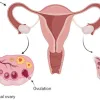Are Genetics a Factor in PCOD?
Polycystic ovary syndrome (PCOS) is a complex hormonal disorder that affects many women worldwide. It is characterized by various symptoms such as irregular periods, excessive hair growth, acne, and weight gain. While the exact cause of PCOS is not fully understood, research suggests that genetics may play a significant role in its development.
Understanding PCOS
PCOS is a condition that affects the ovaries and disrupts the normal menstrual cycle. Women with PCOS tend to have higher levels of androgens (male hormones) in their bodies, which can interfere with ovulation and lead to the formation of cysts on the ovaries.
The Genetic Connection
Research has shown that genetics can contribute to the development of PCOS. Studies have found that women with a family history of PCOS are more likely to develop the condition themselves. In fact, researchers estimate that up to 80% of women with PCOS have a relative with the condition.
Candidate Genes
Several genes have been identified as potential contributors to PCOS. These genes are involved in various aspects of hormone regulation, insulin resistance, and ovarian function. Some of the candidate genes associated with PCOS include:
- INSR: This gene is involved in insulin signaling, and variations in this gene may contribute to insulin resistance, which is often seen in women with PCOS.
- LHCGR: The luteinizing hormone receptor gene is involved in the regulation of ovarian function, and variations in this gene have been associated with PCOS.
- DENND1A: This gene plays a role in androgen metabolism and insulin signaling, and variations in this gene have been linked to PCOS.
- THADA: Variations in this gene have been found to increase the risk of developing PCOS.
While these genes have been identified as potential contributors to PCOS, it is important to note that the condition is likely to be influenced by multiple genes and environmental factors. The interplay between genetics and environmental factors is still being studied to fully understand the complex nature of PCOS.
Environmental Factors
Although genetics may predispose individuals to PCOS, it is important to note that environmental factors also play a role in the development and progression of the condition. These factors include:
- Lifestyle Choices: Poor diet, sedentary lifestyle, and stress can contribute to the development of PCOS and exacerbate its symptoms.
- Obesity: Excess weight and obesity can increase the risk of developing PCOS and worsen its symptoms.
- Hormonal Imbalances: Changes in hormone levels, such as insulin resistance and elevated androgen levels, can contribute to the development of PCOS.
Managing PCOS
While genetics may influence the development of PCOS, it is not a determining factor. The condition can be managed through various lifestyle modifications and medical interventions. Some strategies for managing PCOS include:
- Healthy Diet: Following a balanced diet that includes whole grains, lean protein, fruits, and vegetables can help manage PCOS symptoms and promote overall health.
- Regular Exercise: Engaging in regular physical activity can improve insulin sensitivity, help with weight management, and reduce the severity of PCOS symptoms.
- Medication: Depending on the individual’s symptoms and goals, healthcare professionals may prescribe medications to regulate menstrual cycles, manage insulin resistance, or reduce excessive hair growth.
Introducing Fitpaa
While lifestyle modifications and medical interventions are essential for managing PCOS, technology can also play a role in supporting individuals’ health and fitness goals. Fitpaa is an AI-driven metabolism monitoring and management technology that can assist women with PCOS in achieving their health and fitness goals.
Fitpaa uses state-of-the-art research in Lifestyle Medicine and Behavioral Therapy to optimize metabolism and strengthen the body’s organ systems. By providing personalized fitness plans, nutrition guidance, and real-time guidance technology, Fitpaa aims to help individuals achieve their health and fitness goals with a 100% guarantee.
Fitpaa’s mobile app offers a range of tools and features, including a virtual workout trainer, diet tracker, performance tracking, and progress tracking. The app’s real-time guidance technology incorporates the principles of habit building and cognitive behavioral therapy to inspire individuals and help them stay on track.
To experience the benefits of Fitpaa and achieve your health and fitness goals, download the Fitpaa app today. With Fitpaa’s personalized approach and comprehensive support, you can embark on a journey towards a healthier and happier life.
Remember, genetics may play a role in PCOS, but with the right lifestyle choices, medical interventions, and support from Fitpaa, you can take control of your health and well-being.









